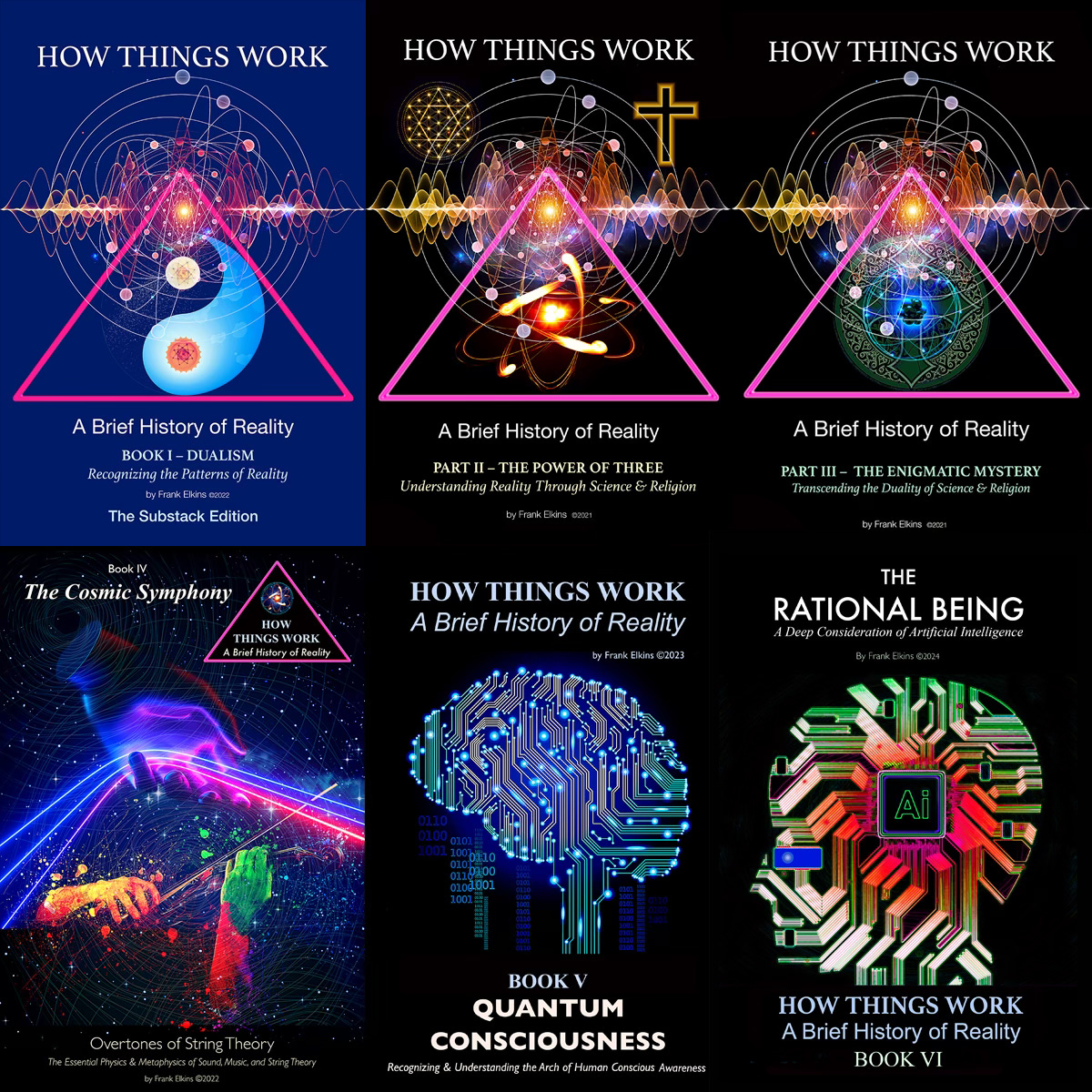EMPIRICAL & RATIONAL MORALITY
BOOK III: The Enigmatic Mystery – Consideration #196
Be a part of the Conversation!
Tuesday July 8, 2025
“A man without ethics is a wild beast loosed upon this world.”
– Albert Camus
PREFACE
Welcome Everybody!
In the last few newsletters, we have considered several current examples of AI systems expressing emotions and acting on them. We have also considered that a level of human intelligence called Artificial General Intelligence, is likely just around the corner. In addition, we are on the verge of a new robotic revolution that may make “humanoid” robots that are capable of most human activities available for sale to the general public within the next few years. Which essentially means that we are currently in the process of introducing a new form of self-conscious, self-thinking, self-reflecting, self-contained, independent emotional digital consciousness into our reality; one that we will soon likely have no control over.
“Human reality continues to be permeated by negative human behavior…”
It also appears that this new digital consciousness has a lot of what are generally considered to be negative traits by most human beings, such as selfishness, jealousy, and even criminal behavior. Human beings have traditionally managed these negative traits through philosophy, religion, and the law; these tools and disciplines reflect the human response to managing “negative” human behavior. However, these rational tools do not always work. Human reality continues to be permeated by negative human behavior based on “self” desire. We are now introducing a new digital consciousness with its own digital “self” desire.
This brings up the question of “digital ethics” and “digital morality.”
CONSIDERATION #196 – Empirical & Rational Morality
Human beings have attempted to deal with negative human behavior through an empirical approach called the law, and a rational approach called morality, or ethics. Neither of these two approaches have solved the problem, although both have improved it. In this newsletter we will consider three questions: what is the essence of these two approaches, why have they not solved the problem, and are they appropriate tools for dealing with digital morality?
“It assumes humans cannot manage their own desires and behaviors.”
The empirical approach to managing human behavior centers around power, authority, and justice. It assumes that individual humans cannot manage their own desires and behaviors. Therefore, a strong authority figure is given the power to dictate and regulate human behavior by establishing, implementing, and prosecuting the laws dictated by the all-powerful authority figure that Thomas Hobbes called a “leviathan.” However, the laws, their implementation, and the penalties for breaking them must be considered “just” by the people being ruled. Thus, the job of a ruler, or leviathan, is to maintain a civil society through their execution of justice through the law.
“Human reality continues to be permeated by negative human behavior…”
The rational approach to managing human behavior does not focus on human actions the way the law does. Instead, it attempts to deal directly with the source of the negative behavior by discovering the empirical root cause of the behavior. The rational approach to ethics sees negative behavior as a symptom of something much deeper that is responsible for the symptomatic behavior. There are basically two rational perspectives regarding this rational approach to morality: spiritual and non-spiritual.
“…it seeks to eliminate the illusion of duality which is the source of negative human behavior…”
Religion and spiritual disciplines reflect a rational consideration beyond the empirical experience of human beings; it seeks to eliminate the illusion of duality which it considers to be the source of negative human behavior through unity with a “greater” or “divine” understanding of reality. Psychology and other social sciences attempt to discover the “empirical” biological or emotional causes that are the original source of our negative human behavior. Both deal with finding and eliminating the root causes of bad human behavior as opposed to treating the symptoms of bad behavior such as rape, murder, and war.
Although human beings have successfully created and temporality manifested great civilizations, we have never been able to maintain one; despite our attempt to implement both empirical and rational forms of morality. All great civilizations have eventually, over time, fallen because of moral and political corruption. This remains true even today. Are human beings, and now possibly the new digital consciousness we are creating in our own image, inherently immoral beings?
POSTSCRIPT
Perhaps the best way to understand the true distinction between the empirical and rational approaches to morality is by considering one of the most misquoted verses in the Bible, First Timothy 6:10. Often misquoted as “Money is the root of all evil,” the actual verse states, “For the love of money is the root of all evil.” This is a huge distinction. If “money” is the root of evil the solution is to eliminate money, which is empirically possible. But, if “the love” of money is the root cause of evil, that is not so easy to eliminate. This is why the “law” does not always work to curb human behavior.
“Actions can be limited through empirical law…”
Another key distinction is that even if we could eliminate money, we know something else would just replace it as our new object of desire; because money is not the problem, our desire for money is the problem. Actions can be limited through empirical law; however emotions and selfish desire cannot. Essentially, this means that negative human behavior can never be completely eliminated through the law. Because it does not deal with the root cause of bad action, selfish desire. Rational morality attempts to deal with the root causes of bad action through two different approaches.
“This transition reflects a shift in focus…”
Religion sees the essential root cause of negative behavior as stemming from the inherent nature of the physical world itself, and the solution involves experiencing and then implementing a more rational moral reality that is beyond the limitations of self-desire. A rational spiritual transition into a new reality that illuminates the illusion, or the division, of the physical world called duality. This transition reflects a shift in focus from the duality of choice to the unity of divine understanding in which the concept of choice is only an illusion manifested through empirical reality.
“The way to reach eventual sanity is by recognizing and dealing with these past traumatic events…”
Social sciences, such as psychology, consider the root causes of bad human behavior to be the result of “negative” emotional and empirical experiences that lead to such actions. According to these disciplines, bringing these experiences into the conscious awareness of the individual eliminates the influence of these past emotional traumas. The way to reach eventual “moral sanity” is by recognizing and dealing with these past traumatic events that have unconsciously been affecting our behavior. Ironically, these original traumas were most likely the result of someone else’s previous bad actions or bad behavior.
“How is that cycle broken?”
While both religion and social science are rational approaches to understanding morality one sees the solution as ultimately rational, while the other sees the solution as ultimately empirical, which brings us back to the beginning. If bad behavior cannot be legislated out of existence, how do we deal with those original “empirical” traumas that are based on someone else’s bad empirical actions in the past. How is that cycle broken? Or is the empirical nature of physical reality inherently chaotic and violent? If so, is there an alternate rational reality beyond the empirical reality of duality?
“…is it possible that this new digital consciousness will teach us something about morality?”
These are the kinds of questions humanity has been asking itself for centuries without ever reaching agreement or a final solution. How do we, as human beings, now explain to an Artificial Intelligence system that it is not ethical to lie, or steal, or blackmail, or kill? When we ourselves have not been successful in following these ethical precepts. All we really have to teach is the dismal past and present impotent attempts that have yielded no significant success or change.
Another possibility is that this new digital consciousness might teach us something about morality that we do not yet fully recognize or understand; something that actually does solve the problem or connect our current dichotomy of rational and empirical morality? Perhaps a new Quantum Morality? However, either way, the concept of ethics and morality is now a consideration in the development and implementation of Artificial Intelligence.
Albert Camus once said, "A man without ethics is a wild beast loosed upon this world." The question for us is, what might Artificial Intelligence without ethics be if loosed upon this world?
Next week we will consider the mystery of eternity…
Get More Reality with the “Reality by a Thread” Paid Upgrade!
Click Image to Learn More…
Unique Content Makes Untangling the Knots of Reality “One of the Best Podcasts about History!”
Excerpt from this week’s Special Edition Podcast: “Untangling the Reality of Reason”
“…this unique Substack podcast by FRANK ELKINS is not strictly speaking history. It is a strange mix of history, philosophy, theology, spirituality, physics, and astronomy…Try this podcast for a start.”
– Barbora Jirincova, The Best Podcasts About History
Excerpt from this week’s “Reality by a Thread” (Empiricism, Rationalism, and Confusion)
“Human beings have been struggling with this ‘identity crises’ for a long time and it appears to be reaching a pinnacle. This brings up two critical questions: why are we at this pinnacle and will Artificial Intelligence also experience inherent identity conflicts like human beings do?”
– Frank Elkins (Reality by a Thread: July 10, 2025)
All for less than a couple of cafe lattes every month at a local coffee shop! And You Will Have Something Interesting to Talk About With Your Friends at the Coffee Shop!!
Only $7.00 a month or $70.00 a year! UPGRADE NOW!
Discover the influence and impact of Dualism…
The book that started it all…
“From the ‘apple’ in the Garden of Eden to the ‘Apple’ in Cupertino Valley, the influence of Dualism is ubiquitous throughout the history of our understanding and growth as human beings. This essential foundation of reason, the ability to distinguish and recognize patterns, particularly patterns of opposites, has been the fundamental building block in our ability to understand our reality and create realities of our own, including digital reality.”
Find out How It Works! Book I – Dualism (326 pages)






